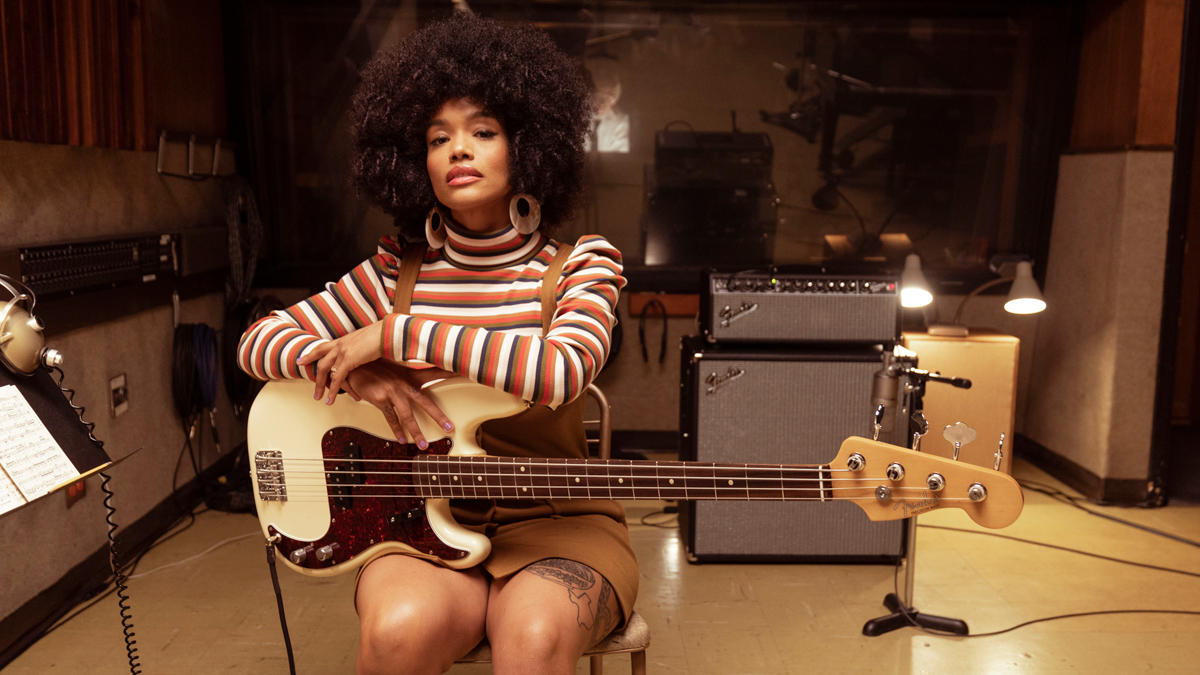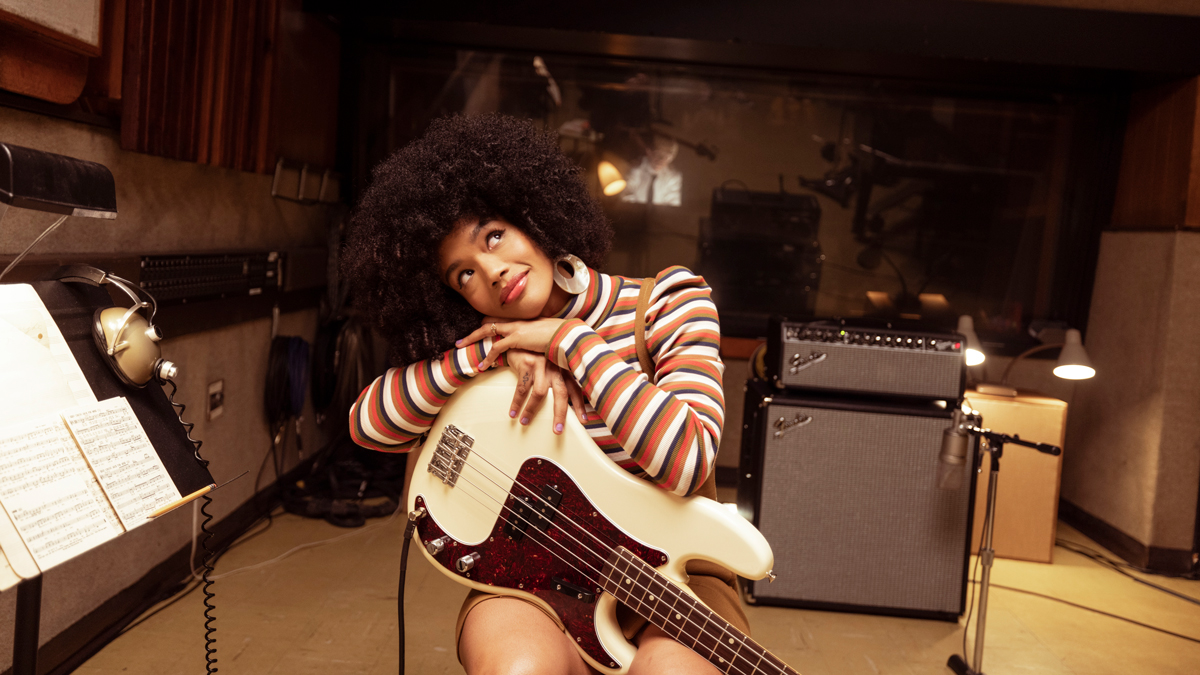“When I'm not playing online, I love to blend with the band. I'm not the one who wants to stand out. But online, that's what it's all about”: April Kae is on a quest to inspire new bass players – and it starts with making bass sound good on phone speakers
From social media to the stage, the new face of Fender basses is broadening horizons for who can play the instrument. She reveals her secret to getting good bass tone on a phone, how she deals with trolls, and what it's like to jam with “the greatest drummer of all time” in Fever 333

April Kae defines the successful modern bassist. She grew up gigging hard, currently touring with punk/hip-hop noisemakers Fever 333, but she’s also a social media star. With over a million followers combined across TikTok and Instagram, she says “It's about bringing more people into bass playing. Specifically, expanding it to Black women. Only about 10 percent of bass players are not men, so to be able to get out there and bring more folks into this world is hugely important to me.”
With her trademark afro and a tidal wave of energy, Kae takes bass to audiences it would not normally reach. “I wanna make people who don’t play bass think it sounds awesome, because I want them to experience just how great it is to play bass,” she enthuses. “It's so important to me because it's so fulfilling. It's great for your brain and your body, and it is a great way to connect with others.”
That attitude unsurprisingly attracted the attention of Fender, who employed Kae to help launch the Vintera II line. Kae was one of several young musicians appearing in the launch video, where she plays the '60s Precision Bass in a Motown studio.
“I was really honored when Fender reached out to me,” she grins. “I am all about this combination between the retro and now. The way I got the platform I did was by sharing '70s music on social media and really activating a lot of Gen Z folks around that type of music. On TikTok and social media, we see songs from whenever popping up again and trending. I think the Vintera line really dovetails with all of that happening.”
When we caught up with her, April was hugging another Vintera II model, her vintage white Telecaster Bass.
“I didn't get to play it in the video, but first of all, this color is awesome,” he says of her prize. “It combines everything I love about the Tele guitar, but in a bass sound. It’s something so different, but it has that retro feel. I have always gravitated towards Fender because it never feels out of date, but at the same time it’s classic. I mean, they invented the bass guitar, right? You can't get more classic than that.”
The Precision remains her first love, though. “As a bass player who loves that '60s/'70s Carol Kaye session sound, I love having the instrument that really matches that, being able to get that same sound I hear on the record. When I first picked up the '60s Precision, I was like, ‘Oh my god, this is that sound.’ I've listened to those songs so many times, so to be able to capture that sound just felt good.”
Get The Pick Newsletter
All the latest guitar news, interviews, lessons, reviews, deals and more, direct to your inbox!
“I'm definitely a P-bass loyalist,” she continues. “It really sits in a mix, it doesn't overshadow anything. The tone knob can make such a difference in your sound. A lot of records now folks have their tone knob turned all the way down to get that really bassy sound and then to cut through a lot of mixes, I'll turn it up. I've been I've been playing P-Basses with Fever 333. I am so stoked to be playing that instrument there. I use distortion on everything, but it cuts through completely differently depending how I set the tone.”
On Instagram, though, you’re more likely to see Kae toting a Jazz Bass. “The J-bass is what I go for when I want to cut through more,” she explains.
“If I want to do something a bit more ‘lead bass’, I will go with the J bass. When I'm not playing online, I love to blend with the band. I'm not the one who wants to stand out. But online, that's what it's all about.”
Getting a bass tone to sound good on cellphone speakers is a mixing nightmare. Happily, April is thrilled to share her secrets.

“I don’t wanna say that’s the bane of my existence, but let's say the essence of my existence!” she laughs.
“I go direct through my interface and I go in clean. Afterward I'll usually add a little bit of distortion to get some more of those mids and highs to pop out. And then I completely cut anything below 60 or 80 hz. I wouldn't cut that if I was mixing for an album, but on a phone, I cut as much of it as I can.
If one note is one cent off, or even if it's not, there are people commenting, ‘Play with a metronome! Get a tuner!’ When I look at the track in my DAW, it's perfectly on beat and perfectly in tune
“When I’m EQing, I'll basically slide the [high pass filter] thing from the left and until it sounds like shit! Then I experiment with bringing out mids and highs, but it's really easy to go too far, because some people listen with headphones. If you look in the comments on some of my earlier videos, people were like, ‘This tone sucks!’ So you’ve got to be really careful about it. Anyone who reads this, reach out to me. I love answering these questions. I'm all about there being more bass players!”
While it’s tempting to think that social media shorts aren’t ‘real’ music, April says it’s harder than playing live: “With a band, you have support, and you have people to help you and you have like humans there to tell you if stuff sounds off.”
Online, Kae also has to deal with trolls. “If one note is one cent off, or even if it's not, there are people commenting, ‘Play with a metronome! Get a tuner!’ When I look at the track in my DAW, it's perfectly on beat and perfectly in tune. There are people on the internet who are out to find people from marginalized backgrounds to attack, but they're not coming to my shows. It’s just the reality of playing online.”
A post shared by APRIL KAE 🦋🏳️🌈 (@aprilkae)
A photo posted by on
Fever 333 spent this summer laying waste to Europe’s largest metal festivals, and Kae loved the change from making videos.
“Jason, the singer, reached out to me at the end of last year,” she reveals of her origins with the band. “I just loved the punk influence, because Rancid and Matt Freeman has always been a huge influence on my playing.
“But Fever also has so many really great riffs. Our guitar player, Brandon Davis, is really incredible, and we have a lot of moments where we're playing these shreddy riffs in unison. We have Thomas Pridgen on drums, who to me is like, the greatest drummer of all time, just an exceptionally accomplished rock drummer with a really strong gospel/funk groove.
“So I get to groove and hang with Thomas during the verses and then really bring it with Brandon for the riffs. And we move a lot on stage in a way that I've never experienced before. But even though we’re doing that, it’s not about sacrificing music for movement. We're gonna dance, we're gonna move, we're gonna jump, but the music's gonna be better.”
April concludes by repeating her passion for sharing bass with more people.
“Guitar talk is so much bigger than bass talk, but we're here, and there's some amazing, amazing videos and musicians coming out of this world,” she enthuses. “It's so inspiring and really exciting. That's part of why I'm excited about the Vintera basses, because it's meant for people who want to get out there. All these sorts of things can really bring in new players.”
- For more information on the Vintera II series, head to Fender.com.
Jenna writes for Total Guitar and Guitar World, and is the former classic rock columnist for Guitar Techniques. She studied with Guthrie Govan at BIMM, and has taught guitar for 15 years. She's toured in 10 countries and played on a Top 10 album (in Sweden).
“I asked him to get me four bass strings because I only had a $29 guitar from Sears”: Bootsy Collins is one of the all-time bass greats, but he started out on guitar. Here’s the sole reason why he switched
“I got that bass for $50 off this coke dealer. I don’t know what Jaco did to it, but he totally messed up the insides!” How Cro-Mags’ Harley Flanagan went from buying a Jaco Pastorius bass on the street to fronting one of hardcore’s most influential bands



![John Mayer and Bob Weir [left] of Dead & Company photographed against a grey background. Mayer wears a blue overshirt and has his signature Silver Sky on his shoulder. Weir wears grey and a bolo tie.](https://cdn.mos.cms.futurecdn.net/C6niSAybzVCHoYcpJ8ZZgE.jpg)

![A black-and-white action shot of Sergeant Thunderhoof perform live: [from left] Mark Sayer, Dan Flitcroft, Jim Camp and Josh Gallop](https://cdn.mos.cms.futurecdn.net/am3UhJbsxAE239XRRZ8zC8.jpg)






